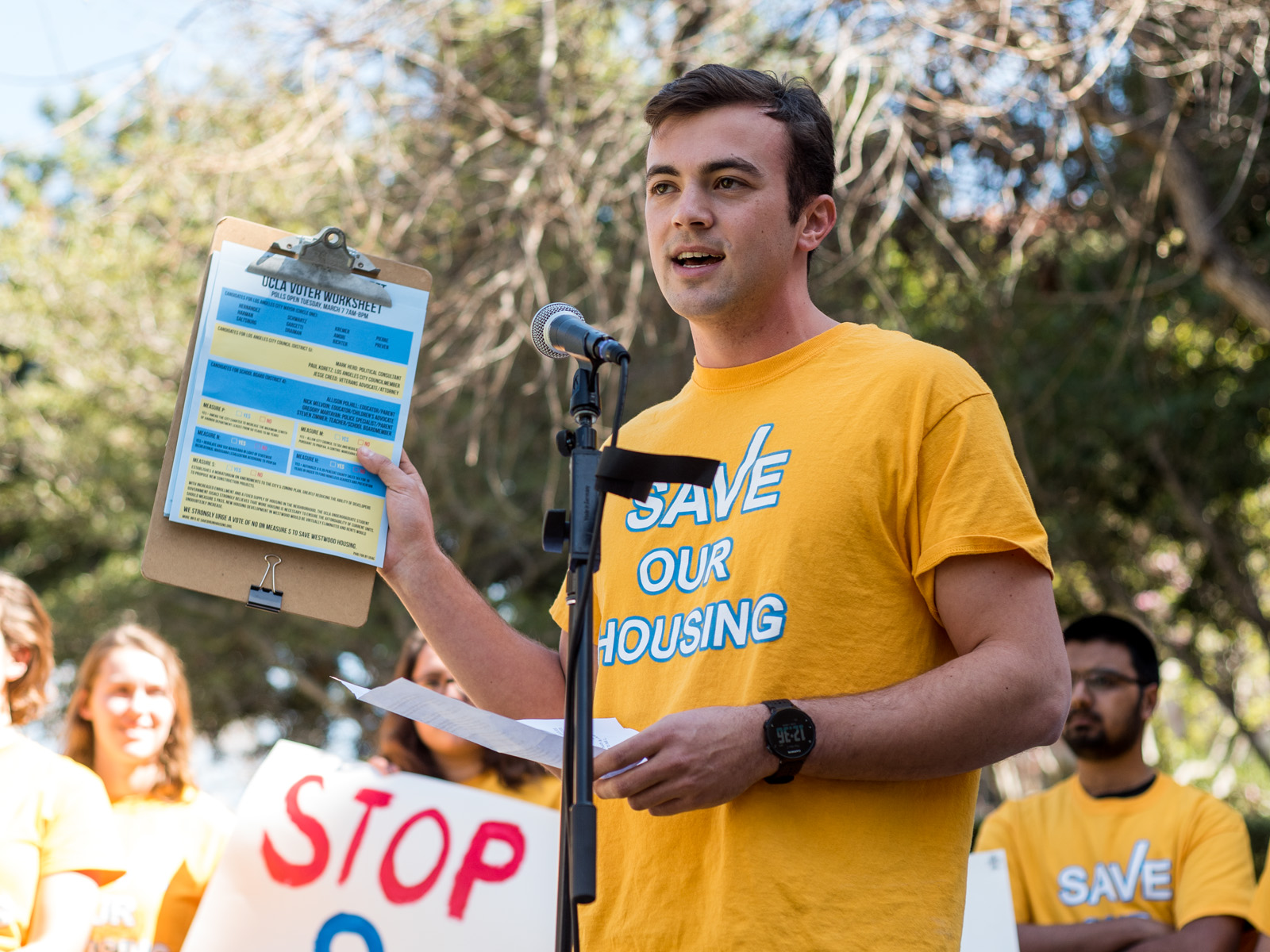Aaron Julian: USAC should foster joint efforts between EVP, other offices

Undergraduate Student Association Council External Vice President Rafi Sands has led numerous campaigns this year to mobilize students on issues like affordable housing. (Farida Saleh/Daily Bruin)
By Aaron Julian
April 13, 2017 10:26 p.m.
Rafi Sands has had a pretty busy year.
The incumbent Undergraduate Students Association Council external vice president and his office have lobbied at UCLA, Sacramento and the District of Columbia for both the presidential and Los Angeles elections – both of which were crucial to the future of LA and UCLA.
It was reaffirming to witness the get-out-the-vote efforts on Bruin Walk that involved multiple stations for voter registration, as well as information campaigns that registered more than 10,000 students to vote and made Measure S, a development moratorium on March’s municipal election ballot, a widely known issue among students.
But it only gets harder from here. In the next few years, there will be a gubernatorial election, more city council elections, a nationwide midterm election and much more. Lobbying politicians effectively can only work if the lobbyists represent an important bloc of support – or resistance – for these candidates.
And much of that responsibility has fallen on the USAC EVP office.
As student debt balloons, job opportunities dry up and thousands of international students’ futures in the United States are threatened, the EVP has become more crucial than ever.
In order to efficiently roll out and implement real change on campus and effective lobbying, the EVP office needs support from other USAC council members. Each member should send an EVP-designate to work with the EVP and find common goals conducive to joint advocacy efforts.
The current political fervor should be matched with equal passion and sophisticated organization by not just the EVP office, but by the rest of the council.
And this would not be the first time different offices in USAC worked together to mobilize students. USAC President Danny Siegel and Facilities Commissioner Sandra Rhee publicly fought alongside Sands to ensure UCLA students voted “no” on Measure S. Their work helped make Measure S a central issue in the local election for UCLA students. Although overall student turnout was low, Sands said that all the groups he visited on Election Day knew about – and opposed – Measure S.
Cooperation clearly works between council members with similar goals, and it rallies students for important causes.
Siegel expressed the importance of elected office holders to work in concert with each other on larger campaigns. These campaigns define the future of our student body, and he is correct in emphasizing them.
Sands has his reservations, however.
“Collaboration is really hard to do. When you work in any public space, egos come in the way. When you expand a project to include more leadership you find more inefficiencies,” he said.
That’s a legitimate concern. As it stands there are two major slates, similar to political parties, on this year’s student government ballot: Defend Affirmative Action and Bruins United. Similar to greater U.S. elections, these parties have underlying tensions between them, and the bad blood between these parties has clotted opportunities for conjunctive action. Even if everyone agrees on policy goals, coordinating between multiple offices can still be tough.
[Related: Independent USAC election candidates can bring new, broader perspectives]
The best way to amend political divides between the candidates is to focus on where their platforms match: Funding the university and protecting Bruins from changes in immigration policy stick out as prominent examples.
The EVP’s Bruin Defenders office serves the EVP’s primary avenue of activism. The office has access to discretionary spending and has dozens of student staff representing UCLA’s undergraduate student body in off-campus advocacy efforts and helping student groups carry out their own campaigns.
Thus, USAC can add a representative for each office to consult with the student groups who normally interface with BD. The council will have to vote to allot these BD representatives with a small discretionary budget, but doing so would allow each USAC office to support the EVP’s efforts with these groups, as well as the EVP’s own advocacy.
These appointees would collaborate with their officer and the other BD appointees to find where those office’s platforms coincide. Once the agendas are set between officers, these appointees can use the small discretionary fund to rally support among the students and spread awareness. In such a large university, each council member is bound to have somewhat different social circles, allowing the office as a whole to extend their advocacy further. The EVP’s lobbying will become more influential each time a student at UCLA engages in politics – and the council can catalyze these efforts.
Due to the good work of the EVP office this year, it can be argued that the office doesn’t need help. Granted, there is not a big problem with the system in place now. But the special circumstances of the Trump era set the stakes too high to not exert all resources available to organize the UCLA student body.
Student issues remain unaddressed on a national level in part because college-aged people participate at relatively low levels.
It’s up to USAC to unify and mobilize students. As Sands pointed out, “The most important thing is that we overcome the politics of USAC elections on day one. The political lines need to be taken back because there are a lot people that care about government advocacy.”
Throughout American history, the church and community center have been at the epicenter of rallying groups of people into prominent political positions. USAC can do the same with Bruins if they pool their efforts and present a cohesive course of action.

